

The Virginia Bar Exam is developed and administered by The Virginia Board of Bar Examiners and the National Conference of Bar Examiners (NCBE®). The Virginia Essay Exam assesses an examinee's understanding of the rules of law of the Commonwealth of Virginia, while the Multistate Bar Examination (MBE®) is a component of the Uniform Bar Examination (UBE®). This article will cover the details of the Virginia Bar Exam, including exam results, requirements, important dates and deadlines, subjects, costs and fees, format, and scoring.
| Virginia Bar Exam Format | ||
|---|---|---|
| Morning (3-hour session) | Afternoon (3-hour session) | |
| Day One | 5 essay questions | 4 essay questions + 10 multiple choice questions |
| Day Two | 100 MBE multiple-choice questions | 100 MBE multiple-choice questions |
On day one, you'll have three hours to answer five essay questions in the morning, and another three hours to answer four essay questions and ten multiple choice questions in the afternoon. These time constraints give you approximately 36 minutes to complete each item. On day two, you'll have three hours to answer 100 MBE multiple-choice questions in the morning and again in the afternoon, giving you about 1 minute and 48 seconds to answer each question.
The Virginia Bar Exam is administered twice a year. Once in February and again in July. Preparing your application and submitting it before the deadline is of ultimate importance. Virginia does not have a late filing period. If you fail to meet the filing deadline, you must wait for the next bar exam.
Dates for the 2024 Virginia Bar Exam are February 27-28 and July 30-31. Applications, along with fees and attachments, must be submitted to the Office of the Secretary on or before the filing deadline. First-time applicants must also submit a completed Character and Fitness Questionnaire.
| Filing Periods | Application Opens | Filing Deadline |
|---|---|---|
| February Bar Exam (Feb 27-28, 2024) | 90 days prior to deadline | December 15, 2023 |
| July Bar Exam (July 30-31, 2024) | 90 days prior to deadline | May 10, 2024 |
| Fee | $575 | |
For more information, including required document list visit the Virginia Board of Bar Examiners website.
To schedule Virginia Bar Exam, you must fill out an application, submit all the proper documentation, pay requisite fees, and carefully follow instructions enumerated on the Board's website.
Filing an original application for the Virginia Bar Exam costs $575. There is an additional $575 fee to submit a Character and Fitness Questionnaire. All important fees are tabulated below.
| Application Type | Fees |
|---|---|
| Original Application | $575 |
| Re-application | $575 |
| Update Previously Filed Application | $175 |
| Character and Fitness Questionnaire | $575 |
| Character and Fitness Update | $175 |
| Others | Fees |
| Admission without Examination | $2,500 |
| MBE Score Advisory Request | $30 |
| MBE Score Transfer Request | $50 |
| Incorrect Payment Fee | $50 |
| Laptop Program | $125 |
Payments must be made payable to "The Virginia Board of Bar Examiners" via one or more money orders, cashier's checks, or certified checks. Fees must be paid before the filing deadline upon submission of an application.
It's no secret that the entire law school journey is an expensive proposition. Thankfully, many scholarships are available to law students and graduates to help offset some of the costs associated with legal education and the early stages of a legal career.
The University of Virginia School of Law has compiled a comprehensive list of external scholarships designed to help law students with the costs associated with law school, bar exam registration, and bar preparation. As a Virginia Bar Exam applicant, it's in your best interest to research these and other resources and apply to as many available scholarships to help you with your bar exam registration and/or bar prep costs. You may view the list here: External Scholarships | University of Virginia School of Law.

The VA Bar Exam tests an examinee's knowledge and understanding of foundational legal principles and the unique rules of law of the Commonwealth of Virginia. Furthermore, Virginia has adopted the MBE component of the UBE, which covers federal law across seven subjects.
The following MBE subjects are tested on the Virginia Bar Exam:
You may find a complete list of subjects, subtopics, and summaries on our MBE Subject Matter Outline.
Both the long-form and short-answer questions will test VA Bar Exam applicants on the following fourteen subjects:
Study formation of contracts, third-party rights, defenses to enforceability, and performance, breach, and discharge.
You’ll be tested on corporate law, agency and partnership, corporations, and limited liability companies.
Covers laws which mediate the relationship between creditor and debtor. Brush up on loan terms, right to collect repayment, collateral, and secured and unsecured loans.
Covers constitutional protections for individuals accused of a crime, the details of what constitutes various crimes (i.e. homicide, robbery, burglary, arson, kidnapping, etc.), and steps leading up to a legal arrest.
In common law, domestic relations covers matters such as divorce, alimony, paternity and parental rights, emancipation of minors, property settlements, adoption, and custody.
Assesses knowledge regarding admission or exclusion of evidence, the presentation of evidence, hearsay, and relevancy.
Covers federal civil, criminal and appellate procedure including rules of evidence, jurisdiction of federal courts, venue, relation of state and federal courts, res judicata, and how rules of law are interpreted and applied by federal courts.
Local governments in Virginia do not have their own authority, but act as agents of the state. Make sure to familiarize yourself with the framework and laws for local governments (Article VII of the Constitution of Virgina and Title 15.2 of the Code of Virginia).
Covers the scope of representation and allocation of authority between client and lawyer, confidentiality, conflicts of interest, and rules arbitrating professional standards of conduct.
Focuses on land and all tangible improvements. Expect to be tested on ownerships, rights, contracts, mortgage/security devices, titles, deeds, recording acts, and landlord-tenant law.
Tort laws protect individuals who have been wronged physically or financially and allow them to legally seek recourse. Brush up on intentional torts, strict responsibility, products liability, and other common torts.
The Uniform Commercial Code regulates security of personal property and is intended to harmonize commercial transactions and sales laws across the US.
Covers civil and criminal procedures of the Commonwealth of Virginia and stipulated in the Rules of Supreme Court of Virginia.
Tests knowledge of decedents’ estates, family protection, living wills, and trusts.Select a Question sample.
A husband and wife were married in State A and lived there for 10 years before separating. One month later, the wife permanently moved to State B and immediately filed for divorce in a federal court in State B. The wife claims that she is entitled to $300,000 in alimony. The husband appeared in the action and has filed a motion to dismiss for lack of subject-matter jurisdiction.
Should the court grant the motion?
Federal courts cannot exercise diversity jurisdiction over cases involving:
A federal court must possess subject-matter jurisdiction to hear the merits of a case before it. Subject-matter jurisdiction can be established through either:
Here, diversity jurisdiction is established since the wife claims that she is entitled to $300,000 and the parties are citizens of different states (States A and B). However, federal courts cannot exercise diversity jurisdiction over cases involving probate matters or domestic relations. Instead, state courts have exclusive jurisdiction over these types of actions (Choice A).* Therefore, the husband's motion to dismiss should be granted.
*The probate and domestic-relations exceptions exist because states have a strong interest in these substantive areas and are more qualified to deal with the constant judicial involvement these types of cases require.
(Choice B) A challenge to subject-matter jurisdiction is never waived. However, a challenge to personal jurisdiction is waived if the defendant has voluntarily appeared in the case, unless it was a special appearance for the express purpose of objecting to personal jurisdiction.
(Choice D) An individual is a citizen of the state where he/she is domiciled—ie, physically present with the intent to remain indefinitely. Since the wife permanently moved to State B, she has established her domicile there.
Educational objective:
Federal courts cannot exercise diversity jurisdiction over cases involving probate matters or domestic relations. Instead, state courts have exclusive jurisdiction over these types of cases.
Bluebook Citations :
A congressional committee investigated the pharmaceutical industry and found that the high cost of prescription drugs purchased and sold in the United States negatively impacted the nation's economy and the health of its citizens. In response, Congress passed a statute that regulates "the retail prices of every purchase or sale of prescription drugs in the United States."
A group of pharmaceutical companies challenged the constitutionality of this statute in federal court.
What is the strongest argument in support of the constitutionality of this statute?
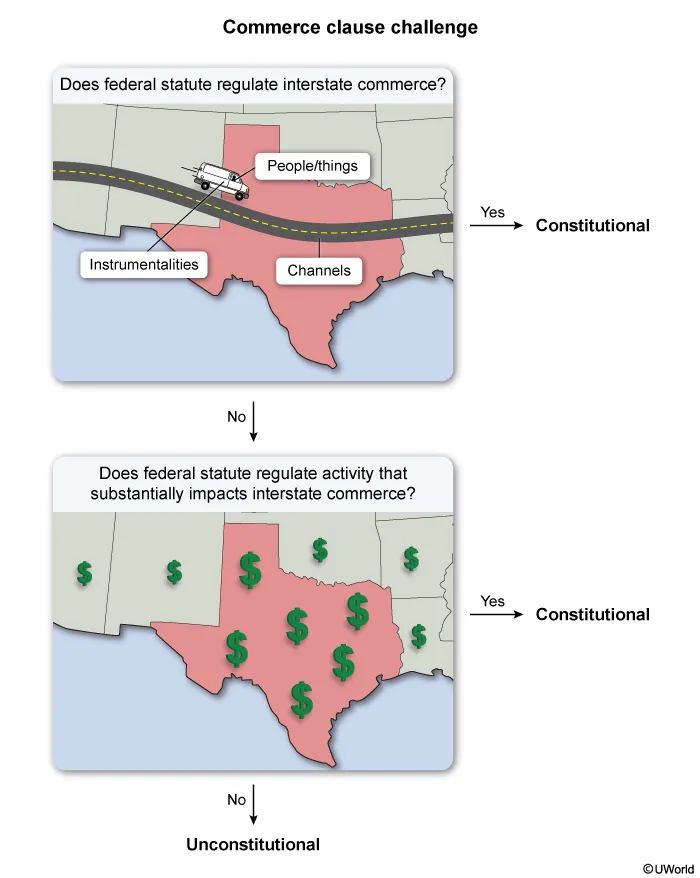
The commerce clause gives Congress broad power to regulate interstate and foreign commerce. This includes:
Since Congress's commerce power is broad, federal statutes are constitutional if there is any rational basis for concluding that the regulated activity substantially affects interstate or foreign commerce. This can be shown through express congressional findings.
Here, the federal statute regulates the retail prices of prescription drugs in the United States. Congress has the authority to regulate such products' interstate transportation, but this statute also regulates in-state purchases and sales (Choice C). Since the congressional committee found that the high cost of prescription drugs negatively impacted the nation's economy, it is rational to conclude that their aggregated in-state purchases and sales substantially impact interstate commerce. Therefore, this is the strongest argument to support this statute.
(Choice A) The taxing and spending clause empowers Congress to tax and spend for the general welfare. But regulating prices is not equivalent to taxing or spending.
(Choice B) Congress cannot regulate the prices of every domestic purchase and sale of goods since it cannot regulate purely in-state sales that do not substantially affect interstate commerce.
Educational objective:
The commerce clause empowers Congress to regulate (1) channels and instrumentalities of, (2) persons and things moving in, and (3) in-state activities that—singly or in the aggregate—substantially affect interstate or foreign commerce.
Bluebook Citations :
The owner of a new office building contracted with a well-known landscaper to design and install landscaping around the building for $30,000. The agreement was memorialized in writing, was signed by both parties, and called for a budget of $5,000 for trees, shrubs, sod, and materials. The contract required the landscaper to complete the work within six months. Due to an unexpected increase in the price of trees and shrubs, the landscaper abandoned the project and never completed any of the work.
Three years after the landscaper's deadline, the building owner sued the landscaper for breach of contract. In the jurisdiction, the statute of limitations for breach of a services contract is two years after the breach, and the statute of limitations for breach of a sale-of-goods contract is four years.
Can the owner recover damages from the landscaper?
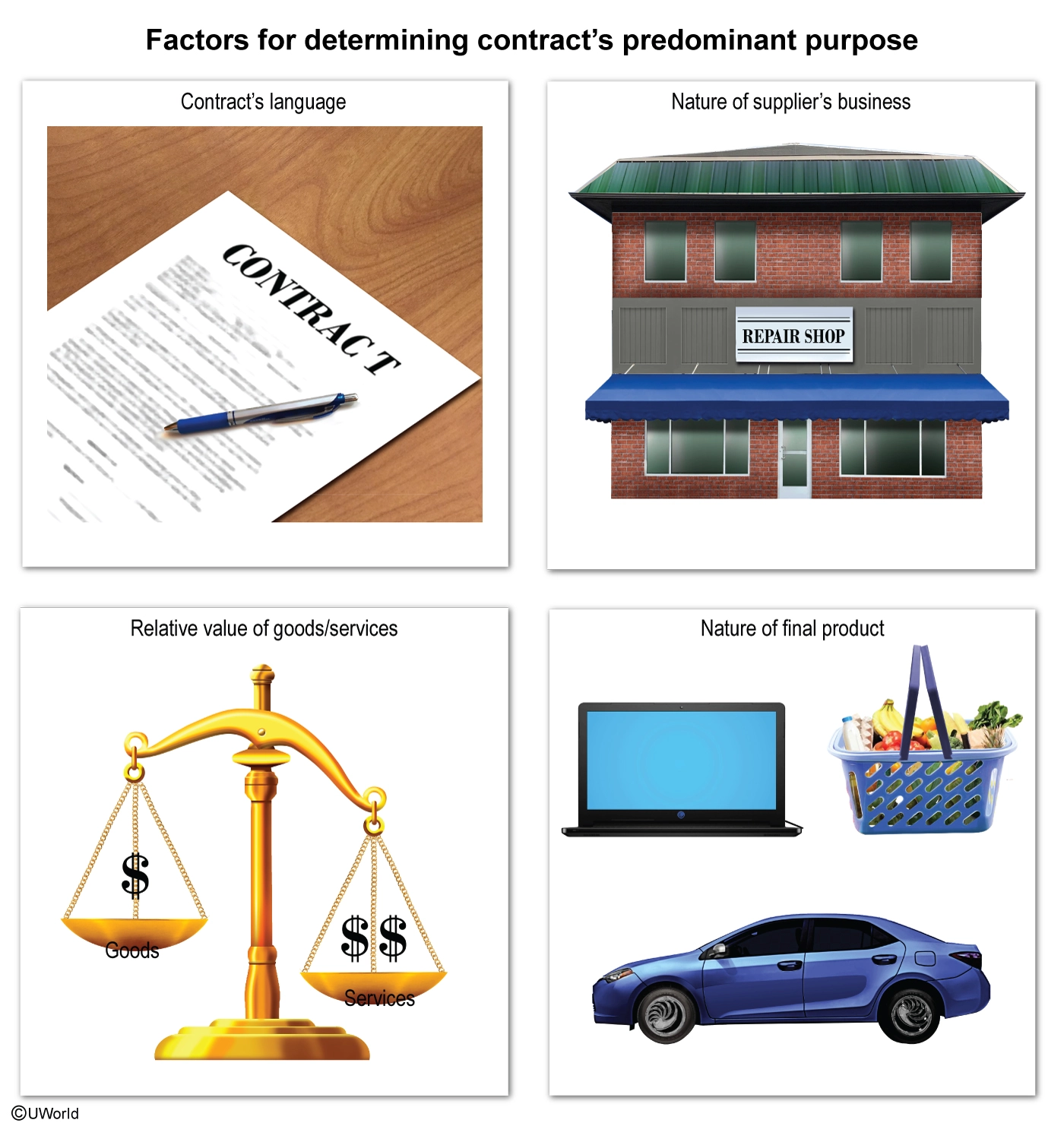
Contracts for the sale of goods are governed by Article 2 of the Uniform Commercial Code (UCC), while contracts for services are governed by common law. However, some contracts involve the sale of goods and the rendering of services. To determine which law applies to a "mixed" or "hybrid" contract, courts ask whether its predominant purpose was the sale of goods or the rendering of services. The following factors are relevant to this determination:
Here, the building owner contracted to buy goods (eg, trees, shrubs, sod) and services (ie, designing and installing the landscaping). The owner likely hired the well-known landscaper due to his skill in performing landscaping services, and the $5,000 budget for goods was just one-sixth of the $30,000 contract price. Therefore, the contract primarily calls for services and is subject to the jurisdiction's two-year statute of limitations. And since the owner sued three years after the breach, the owner cannot recover damages from the landscaper.
(Choice A) The predominant-purpose test is unnecessary when a contract is divisible—ie, when the payment for goods can easily be separated from the payment for services. But here, the contract is likely indivisible since it combined the sale of the trees, shrubs, and sod with their installation.
(Choices C & D) The predominant-purpose test focuses on the parties' reason for entering the contract—not for breaching it. Therefore, it is irrelevant that the landscaper's breach was (1) a result of an increase in the price of goods or (2) willful.
Educational objective:
Sale-of-goods contracts are governed by the UCC, while services contracts are governed by common law. When a contract calls for the sale of goods AND the rendering of services, the contract's primary purpose determines whether the UCC or common law applies.
Bluebook Citations :
A man and a woman dated for several weeks. During that time, the man repeatedly asked the woman to have sex. Each time, the woman responded that she would not have sex with the man unless they were married. One evening, the man promised the woman that they would elope the following weekend if she would agree to have sex. The woman agreed and the couple had sex. The following weekend, the man told the woman that he had no intention of eloping and only made that promise to get the woman's consent. The woman reported the man to the police, who later arrested and charged the man with rape.
Is the man guilty of rape?
In most modern jurisdictions, rape is defined as sexual intercourse with another without that person's consent.* This means that rape did not occur if the victim consented to sexual intercourse. However, a victim's consent may be ineffective if it was obtained by fraud. There are two types of fraud:
As a result, consent obtained by fraud in factum is not a valid defense to rape, but consent obtained by fraud in the inducement is a valid defense.
Here, the man falsely promised the woman that they would elope if she agreed to have sex with him. Since the woman knew that the act to which she consented was sexual intercourse, her consent was obtained by fraud in the inducement (Choices A & C). This type of fraud did not negate the woman's consent, so the man is not guilty of rape (Choice D).
*At common law, rape was defined as (1) unlawful sexual intercourse (2) with a female who is not the defendant's wife (3) against her will by force or threat of force.
Educational objective:
Fraud in factum occurs when the fraud pertains to the nature of the act itself and negates a rape victim's consent. In contrast, fraud in the inducement occurs when fraud is used to gain consent to what the victim knows is an act of sexual intercourse and does not negate the victim's consent.
A plaintiff sued a defendant for negligence to recover damages that the plaintiff suffered as a result of a crash between the two parties. At trial, the plaintiff's attorney called the plaintiff's wife to testify as to what she witnessed on the day of the crash. On cross-examination of the wife, the defendant's lawyer elicited several responses that tended to show that the plaintiff's actions constituted contributory negligence. The plaintiff's attorney seeks to ask the wife several questions on redirect examination, but the defendant's attorney objected.
What is the strongest argument that the court must allow redirect examination of the wife?
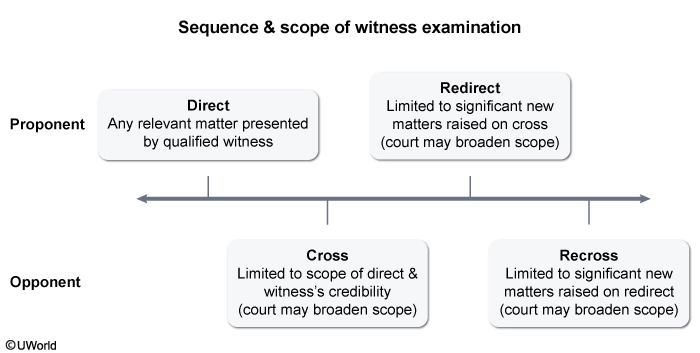
Federal Rule of Evidence 611 gives trial courts the authority to exercise reasonable control over the mode and order of examining witnesses at trial. This includes the discretion to determine whether—and to what extent—redirect examination of witnesses should be permitted. But when a party raises a significant new matter while cross-examining a witness, the court must allow the opposing party to address that matter through redirect examination.
Therefore, the strongest argument for allowing redirect examination of the plaintiff's wife is that the plaintiff's attorney seeks to reply to significant new matters that were raised on cross-examination.
(Choice A) A party is expected to elicit all significant information during direct examination of a witness. Therefore, a court need not permit redirect examination to allow the party to provide information inadvertently omitted on direct examination.
(Choices B & C) Redirect examination is generally limited to significant new matters raised on cross-examination. Therefore, a party is not entitled to redirect examination to (1) reiterate information like the necessary elements of the claim or (2) reply to all matters addressed in cross-examination.
Educational objective:
When a party raises a significant new matter on cross-examination of a witness, the court must allow redirect examination by the opposing party to address that matter.
Bluebook Citations :
Twenty years ago, a man who owned a 20-acre ranch agreed to sell all of his mineral rights to his neighbor. The man executed a warranty deed conveying the mineral estate to the neighbor, who failed to record the deed.
The following year, a woman moved her mobile home onto an undeveloped five-acre portion of the man's ranch. After the woman had lived on the property for 10 years, a local drilling company began operations on a nearby tract to drill a natural gas well. Believing that the woman owned the property, the drilling company approached the woman about leasing the mineral rights on her property and requested that the woman sign a lease of her mineral rights. The woman signed the lease as requested, and it was promptly and properly recorded. The drilling operations were successful, and the drilling company prepared to distribute profits from royalties. However, a dispute arose between the neighbor and the woman, as both parties claim ownership of the minerals.
The period of time to acquire title by adverse possession in the jurisdiction is 10 years.
In an action to determine title, is the court likely to award title to the mineral estate to the woman?
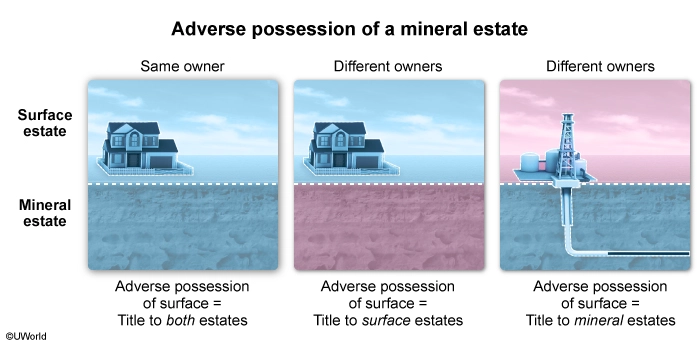
An adverse possessor can acquire title to land owned by another if his/her possession of the land is:
If the surface and mineral estates are owned by the same party, then the adverse possessor will acquire title to both estates—even if only one estate is actually possessed. But if the mineral estate has been severed from the surface estate (ie, the surface and mineral estates are owned by different parties), then the adverse possessor will only acquire title to the estate that is actually possessed. The mineral estate is actually possessed when the adverse possessor mines or drills wells on the land.
Here, the neighbor purchased the mineral estate from the man, thereby severing the mineral estate from the surface estate. And since the woman merely lived on the property for the 10-year statutory period—she did not attempt to mine or drill a well on the mineral estate—she actually possessed only the surface estate during that time (Choice D). This means that the woman did not adversely possess the mineral estate, and the court is not likely to award her title to that estate.
(Choice B) Adverse possession of a mineral estate requires the commencement of drilling or mining operations. Merely signing a lease of the mineral rights is not enough.
(Choice C) A deed need not be recorded to be valid, so the neighbor's failure to record has no impact on whether the woman adversely possessed the mineral estate.
Educational objective:
If a mineral estate has previously been severed from the surface estate (ie, surface and minerals owned by different persons), then an adverse possessor can only acquire title to the mineral estate by actually possessing the minerals (eg, by mining or drilling wells).
A teenager was riding a bicycle when she saw a classmate walking toward her. The teenager rode quickly toward the classmate, knowing that he would think she would run into him on her current trajectory. The teenager was not purposefully trying to harm or touch him. The classmate saw the teenager riding toward him and yelled at her to stop. The teenager swerved at the last moment and avoided hitting him. The classmate had a panic attack because he thought that the teenager would hit him.
Is the classmate likely to succeed if he sues the teenager for assault?
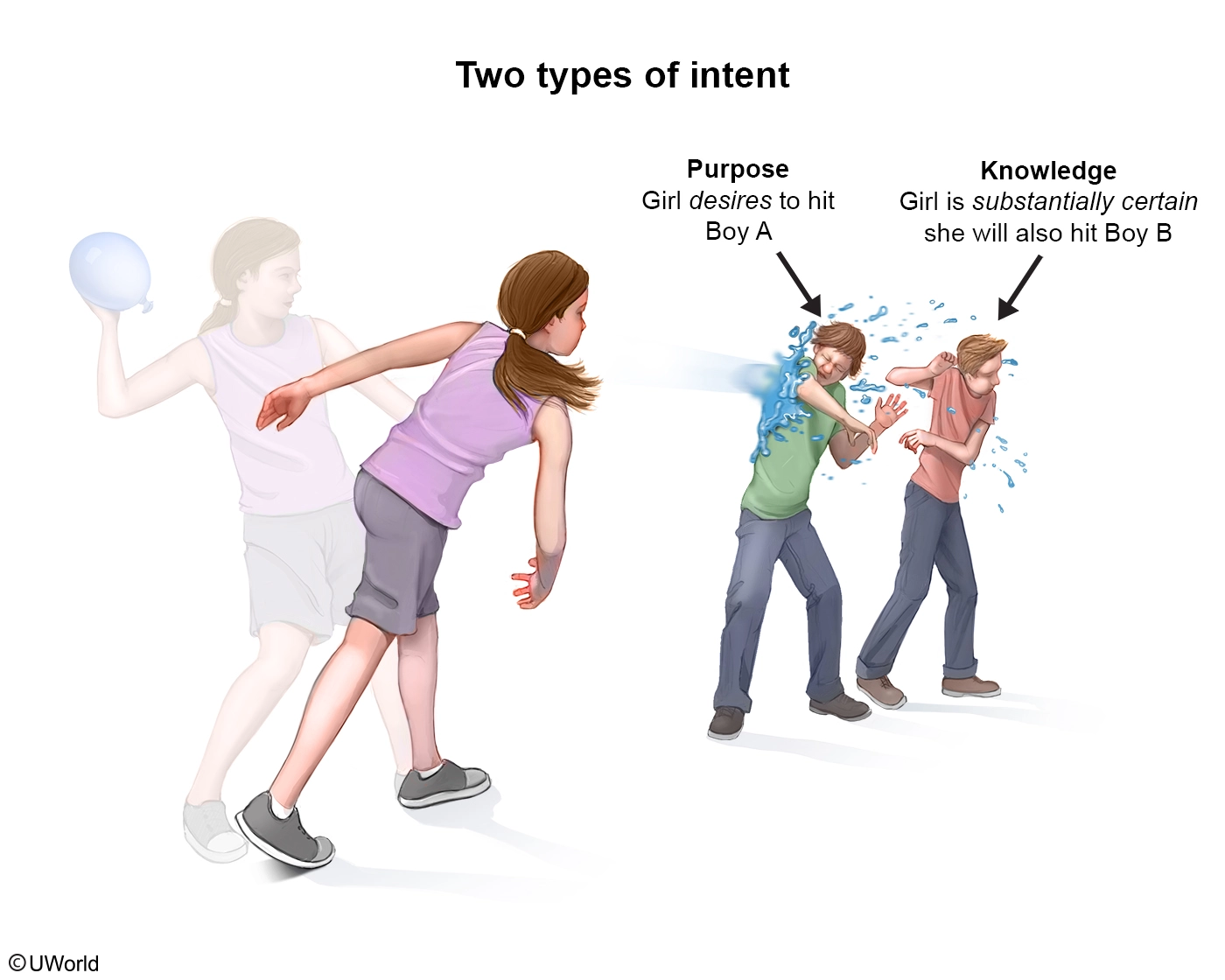
Assault occurs when (1) a defendant intends to cause the plaintiff to anticipate an imminent, and harmful or offensive, contact with the plaintiff's person and (2) the defendant's affirmative conduct causes the plaintiff to anticipate such contact. The intent requirement is met when the defendant acts with either:
Here, the teenager rode her bicycle directly at her classmate, causing him to think that she would hit him (anticipation of imminent contact). And since the teenager knew with substantial certainty that the classmate would think she would run into him, she acted with the requisite intent. As a result, the classmate is likely to succeed in a suit against the teenager for assault.
(Choice A) Assault merely requires that the plaintiff be placed in anticipation of imminent contact. Actual bodily contact is not required. Therefore, the fact that the teenager did not make contact with the classmate is irrelevant.
(Choice B) The intent to make contact with the plaintiff is a requirement for battery, but assault merely requires the intent to cause the plaintiff to anticipate imminent contact. Therefore, the fact that the teenager did not purposefully try to harm or touch the classmate does not absolve her of liability for assault.
(Choice D) Extreme and outrageous conduct (i.e., conduct that is unacceptable in civilized society) is an element of intentional infliction of emotional distress—not assault, which only requires intentional conduct.
Educational objective:
For assault, intent exists when a defendant acts with the purpose (desire) or knowledge (substantial certainty) that his/her conduct will cause the plaintiff to anticipate an imminent, and harmful or offensive, contact.
Take a look at a typical competitor sample question below. Their practice questions might parody the exam, but ours consistently meet or exceed exam-level difficulty. Their limited explanations address the right answer choice but do not go the extra mile to explain the wrong choices – so you don’t make the same mistakes on exam day.
A mother gave her land to her two kids, a son, and a daughter, as joint tenants. The son built two adjoining homes on the land. He lived in one house and rented the other. The daughter lived out of the country and never visited the land. The daughter needed money, so she sold her interest in the land to her ex-boyfriend. Her ex-boyfriend immediately hired a developer to build a third home on the land. Soon after the daughter had sold her interest in the land, she was killed in a motorcycle accident. The ex-boyfriend is now asking the court for a judicial partition of the land. The son contends that upon his sister's death, he was now the sole owner of the land.
How should the court rule?